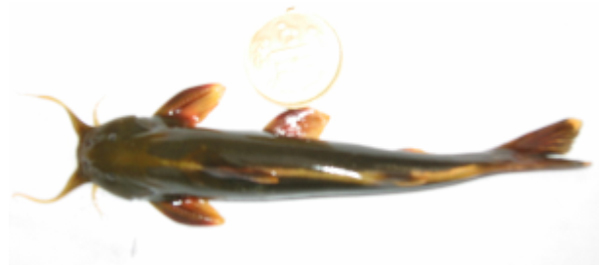Pseudecheneis
sulcata
(McClelland,
1842)
Sucker throat catfish
View all media / Upload your photos and videos
Expand all
Classification / Names
Teleostei (teleosts) > Siluriformes (Catfishes) >
Sisoridae (Sisorid catfishes)
> Glyptosterninae
Etymology: Pseudecheneis: Greek, pseudes = false + Greek, echein = to hold + Greek, nays = ship; remora, suckling fish; 1774 (Ref. 45335).
More on author:
McClelland.
Environment / milieu / depth range / climate zone / distribution range
Freshwater; demersal; tropical.
Distribution
Size / Weight / Age
Max length: 20.0 cm TL male/unsexed (Ref. 41236).
Short description
Dorsal soft rays (total): 7; Anal soft rays: 11 - 12; Vertebrae: 37 - 39. Excluding Pseudecheneis paviei, Pseudecheneis sulcatoides, and Pseudecheneis sympelvica, this species differs from other all congeners by the absence of a prominent bony spur on the anterodorsal surface of the first dorsal-fin pterygiophore. Can be separated from these three species by the combination of the following characters: body elongate with 36-39 vertebrae; thoracic adhesive apparatus with 12-14 transverse laminae; separate pelvic fin; caudal peduncle length 25.0-28.3% SL; presence of a first-dorsal element; complex vertebra with bifid neural spines. Additional characters useful to distinguish this species include: caudal-peduncle depth 4.0-5.2% SL; eye diameter 8.8-10.6% HL; pelvic-fin length 21.2-28.7% SL; length of adipose-fin base 17.8-22.7%; body with pale colored patches; neural spines of the last 2-3 preanal and first 6-7 postanal vertebrae gradually increasing in height; pectoral fin length 121.6-156.3% HL; and vertebrae 37 (Ref. 74729). Description: D i+6; A iii,8, iv,7, iv,8; P i+12, i+13; V i+5 (Ref. 57830).
Biology
Found in fast-flowing hill streams. Prefers deep riffles and runs over gravel, cobble substrates (Ref. 12045).
Main reference
Zhou, W., X. Li and Y. Yang 2008 A review of the catfish genus Pseudecheneis (Siluriformes: Sisoridae) from China, with the description of four new species from Yunnan. Raffles Bull. Zool. 56(1):107-124. (Ref. 74729)
IUCN Red List Status (Ref. 125652)
Least Concern (LC); date assessed: October 12 2009
CITES (Ref. 131153)
Not Evaluated
CMS (Ref. 116361)
Not Evaluated
Threat to humans
Harmless
More information
- Countries
- FAO areas
- Ecosystems
- Occurrences
- Introductions
- Stocks
- Ecology
- Diet
- Food items
- Food consumption
- Ration
- Common names
- Synonyms
- Metabolism
- Predators
- Ecotoxicology
- Reproduction
- Maturity
- Spawning
- Spawning aggregation
- Fecundity
- Eggs
- Egg development
- Age/Size
- Growth
- Length-weight
- Length-length
- Length-frequencies
- Morphometrics
- Morphology
- Larvae
- Larval dynamics
- Recruitment
- Abundance
- References
- Aquaculture
- Aquaculture profile
- Strains
- Genetics
- Allele frequencies
- Heritability
- Diseases
- Processing
- Mass conversion
- Vision
- Pictures
- Stamps, Coins Misc.
- Sounds
- Ciguatera
- Speed
- Swim. type
- Gill area
- Otoliths
- Brains
Estimates based on models
Phylogenetic diversity index (Ref. 82804): PD50 = 0.5 [Uniqueness, from 0.5 = low to 2.0 = high].
Bayesian length-weight: a=0.00589 (0.00264 - 0.01315), b=3.08 (2.88 - 3.28), in cm total length, based on LWR estimates for this (Sub)family-body shape (Ref. 93245).
Trophic level (Ref. 69278): 3.2 ±0.4 se; Based on size and trophs of closest relatives.
Resilience (Ref. 120179): Medium, minimum population doubling time 1.4 - 4.4 years (Preliminary K or Fecundity.).
Fishing vulnerability (Ref. 59153): Low vulnerability (10 of 100).
Nutrients (Ref. 124155): Calcium = 0 [0, 0] mg/100g; Iron = 0 [0, 0] mg/100g; Protein = 0 [0, 0] %; Omega3 = 0 [0, 0] g/100g; Selenium = 0 [0, 0] μg/100g; VitaminA = 0 [0, 0] μg/100g; Zinc = 0 [0, 0] mg/100g (wet weight);

